| Listing 1 - 10 of 21 | << page >> |
Sort by
|
Book
ISBN: 9780822368120 0822368129 Year: 2014 Publisher: Durham, N.C. Duke University Press
Abstract | Keywords | Export | Availability | Bookmark
 Loading...
Loading...Choose an application
- Reference Manager
- EndNote
- RefWorks (Direct export to RefWorks)
Economics --- United States --- 330.2 --- 330.40 --- Geschiedenis van het economisch en sociaal denken --- Evolution historique de la pensée économique et sociale: généralités --- History of the economic and social thinking --- 330.40 Geschiedenis van het economisch en sociaal denken --- 330.40 Evolution historique de la pensée économique et sociale: généralités --- 330.40 History of the economic and social thinking --- Economische analyse en research. Theorie van de informatie. --- Geschiedenis van het economisch en sociaal denken. --- Economische analyse en research. Theorie van de informatie --- United States of America
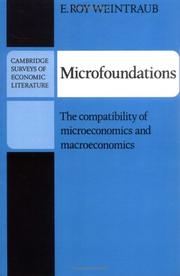
ISBN: 0521223059 0521294452 0511559577 9780521223058 9780521294454 9780511559570 Year: 1979 Publisher: Cambridge Cambridge University Press
Abstract | Keywords | Export | Availability | Bookmark
 Loading...
Loading...Choose an application
- Reference Manager
- EndNote
- RefWorks (Direct export to RefWorks)
This is the first full-length survey of current work which examines the compatibility of microeconomics and macroeconomics. Its particular distinction is that it makes accessible, to non-specialists, those extensive modern refinements of general equilibrium theory which are linked to macroeconomics and monetary theory. Part I traces the development and interlocking nature of two scientific research prgrams, macroeconomics and neo-Walrasian analysis. The five chapters in this part examine general equilibrium theory, Keynes' contribution, the 'neoclassical synthesis', and the Clower-Leijonhufvud contributions to questions of systemic coordination. The four chapters of Part II place recent work on the micro-foundations of macroeconomics within a taxonomic scheme of Walrasian equilibrium, Walrasian disequilibrium, Edgeworthian equilibrium, and Edgeworthian disequilibrium. Part III, a single chapter, provides an overview of the subject and ventures some conclusions.
Microeconomics --- Macroeconomics --- Equilibrium (Economics) --- Economics --- Micro-économie --- Macroéconomie --- Equilibre (Economie politique) --- Economie politique --- Mathematical models --- Modèles mathématiques --- 330.101 --- -Equilibrium (Economics) --- micro-economie --- macro-economie --- 330.1 --- Price theory --- Disequilibrium (Economics) --- Economic equilibrium --- General equilibrium (Economics) --- Partial equilibrium (Economics) --- Stagnation (Economics) --- Statics and dynamics (Social sciences) --- Economic theory --- Political economy --- Social sciences --- Economic man --- Economische analyse. Economische methodologie. Economische onderzoeksmethoden--(theoretische economie) --- 330.101 Economische analyse. Economische methodologie. Economische onderzoeksmethoden--(theoretische economie) --- Micro-économie --- Macroéconomie --- Modèles mathématiques --- Economics, Mathematical --- DGE (Economics) --- DSGE (Economics) --- Dynamic stochastic general equilibrium (Economics) --- SDGE (Economic theory) --- Economics - Mathematical models --- Business, Economy and Management --- Microeconomics. --- Macroeconomics. --- Mathematical models.
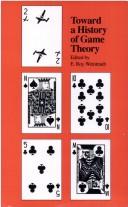
ISBN: 0822312530 Year: 1992 Publisher: Durham (N.C.) : Duke university press,
Abstract | Keywords | Export | Availability | Bookmark
 Loading...
Loading...Choose an application
- Reference Manager
- EndNote
- RefWorks (Direct export to RefWorks)
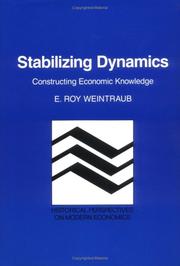
ISBN: 0521393469 0511571836 9780521393461 9780511571831 Year: 1991 Publisher: Cambridge Cambridge University Press
Abstract | Keywords | Export | Availability | Bookmark
 Loading...
Loading...Choose an application
- Reference Manager
- EndNote
- RefWorks (Direct export to RefWorks)
Today, economic theory is a mathematical theory, but that was not always the case. Major changes in the ways economists presented their arguments to one another occurred between the late 1930s and the early 1950s; over that period the discipline became mathematized. Professor Weintraub, a noted scholar of the modern history of economic thought, argues that those changes were not merely cosmetic: The mathematical forms of the arguments significantly altered the substance of the arguments. Stabilizing Dynamics is particularly concerned with the ways in which the rich and confusing talk of the 1930s evolved, over a fifteen-year period, into technical analysis of some mathematical structures. The author describes the context for the history of that change, locating it in the broader intellectual currents, and shows how the history of modern economics can be seen as a confluence of several disparate traditions. Historiographically, this book offers one of the first constructivist accounts of modern economic analysis.
Economic schools --- Equilibrium (Economics) --- Statics and dynamics (Social sciences) --- AA / International- internationaal --- 330.01 --- Theorie van het economisch evenwicht. --- Dynamics and statics (Social sciences) --- Equilibrium (Social sciences) --- Economics --- Social evolution --- Social sciences --- Sociology --- DGE (Economics) --- Disequilibrium (Economics) --- DSGE (Economics) --- Dynamic stochastic general equilibrium (Economics) --- Economic equilibrium --- General equilibrium (Economics) --- Partial equilibrium (Economics) --- SDGE (Economic theory) --- Theorie van het economisch evenwicht --- Équilibre (économie politique) --- Business, Economy and Management --- Statique et dynamique (sciences sociales)
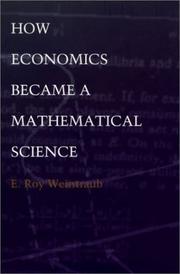
ISBN: 0822328712 0822328569 0822383802 1282920359 9786612920356 Year: 2002 Publisher: Durham, N.C. Duke University Press
Abstract | Keywords | Export | Availability | Bookmark
 Loading...
Loading...Choose an application
- Reference Manager
- EndNote
- RefWorks (Direct export to RefWorks)
Economics, Mathematical --- Economics --- Mathematical economics --- Econometrics --- Mathematics --- History --- Methodology --- Quantitative methods (economics) --- 330.40 --- AA / International- internationaal --- Geschiedenis van het economisch en sociaal denken
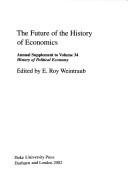
ISBN: 0822365472 Year: 2002 Publisher: Durham, N.C. Duke University Press
Abstract | Keywords | Export | Availability | Bookmark
 Loading...
Loading...Choose an application
- Reference Manager
- EndNote
- RefWorks (Direct export to RefWorks)
Book
Year: 1975 Publisher: London Macmillan
Abstract | Keywords | Export | Availability | Bookmark
 Loading...
Loading...Choose an application
- Reference Manager
- EndNote
- RefWorks (Direct export to RefWorks)
Book
Year: 1974 Publisher: London Macmillan
Abstract | Keywords | Export | Availability | Bookmark
 Loading...
Loading...Choose an application
- Reference Manager
- EndNote
- RefWorks (Direct export to RefWorks)
Book
ISSN: 13597906 ISBN: 9781138049956 9781315169194 1138049956 1315169193 1351688219 1351688227 1351688200 9781351688222 9781351688215 Year: 2018 Volume: 213 Publisher: Boca Raton, FL : Routledge,
Abstract | Keywords | Export | Availability | Bookmark
 Loading...
Loading...Choose an application
- Reference Manager
- EndNote
- RefWorks (Direct export to RefWorks)
In recent years, the focus of historians of economic thought has changed to also include the ideas and practices of contemporary economists. This has opened up new questions regarding the utilization of sources, choice of method, narrative styles, and ethical issues, as well as a new awareness of the historian’s place, role, and task. This book brings together leading contributors to provide, for the first time, a methodological overview of the historiography of economics. Emphasising the quality of the scholarship of recent decades, the book seeks to provide research tools for future historians of economic thought, as well as to any historians of social science with an interest in historiographic issues.
Economic schools --- Economics --- History --- Economics - History --- Economic theory --- Political economy --- Social sciences --- Economic man --- Historiography.
Book
Abstract | Keywords | Export | Availability | Bookmark
 Loading...
Loading...Choose an application
- Reference Manager
- EndNote
- RefWorks (Direct export to RefWorks)
Finding Equilibrium explores the post-World War II transformation of economics by constructing a history of the proof of its central dogma-that a competitive market economy may possess a set of equilibrium prices. The model economy for which the theorem could be proved was mapped out in 1954 by Kenneth Arrow and Gerard Debreu collaboratively, and by Lionel McKenzie separately, and would become widely known as the "Arrow-Debreu Model." While Arrow and Debreu would later go on to win separate Nobel prizes in economics, McKenzie would never receive it. Till Düppe and E. Roy Weintraub explore the lives and work of these economists and the issues of scientific credit against the extraordinary backdrop of overlapping research communities and an economics discipline that was shifting dramatically to mathematical modes of expression. Based on recently opened archives, Finding Equilibrium shows the complex interplay between each man's personal life and work, and examines compelling ideas about scientific credit, publication, regard for different research institutions, and the awarding of Nobel prizes. Instead of asking whether recognition was rightly or wrongly given, and who were the heroes or villains, the book considers attitudes toward intellectual credit and strategies to gain it vis-à-vis the communities that grant it. Telling the story behind the proof of the central theorem in economics, Finding Equilibrium sheds light on the changing nature of the scientific community and the critical connections between the personal and public rewards of scientific work.
330.40 --- 330.08 --- Geschiedenis van het economisch en sociaal denken --- Evolution historique de la pensée économique et sociale: généralités --- History of the economic and social thinking --- 330.40 Geschiedenis van het economisch en sociaal denken --- 330.40 Evolution historique de la pensée économique et sociale: généralités --- 330.40 History of the economic and social thinking --- Economisten
| Listing 1 - 10 of 21 | << page >> |
Sort by
|

 Search
Search Feedback
Feedback About UniCat
About UniCat  Help
Help News
News